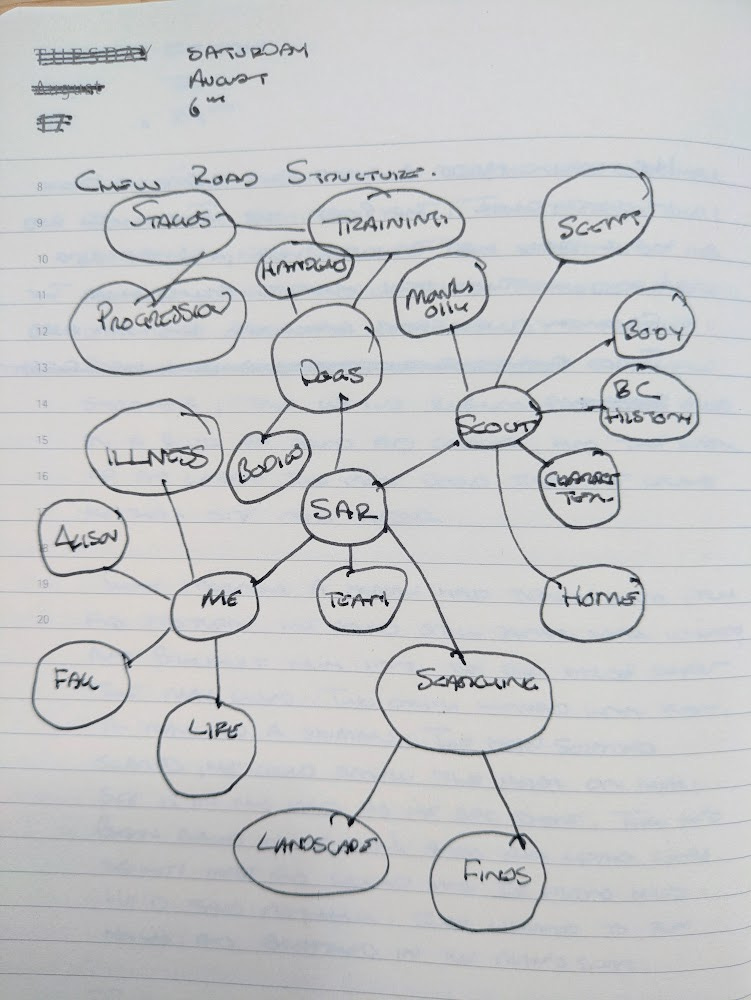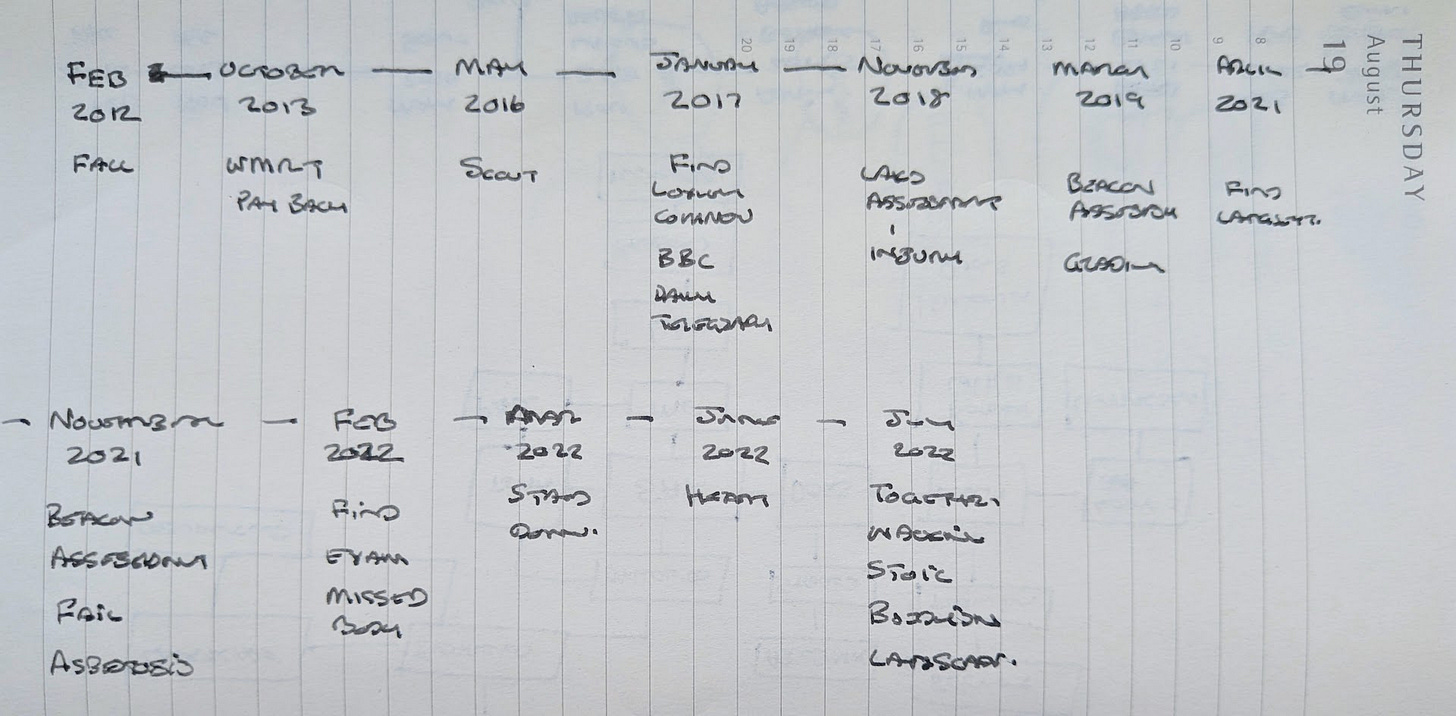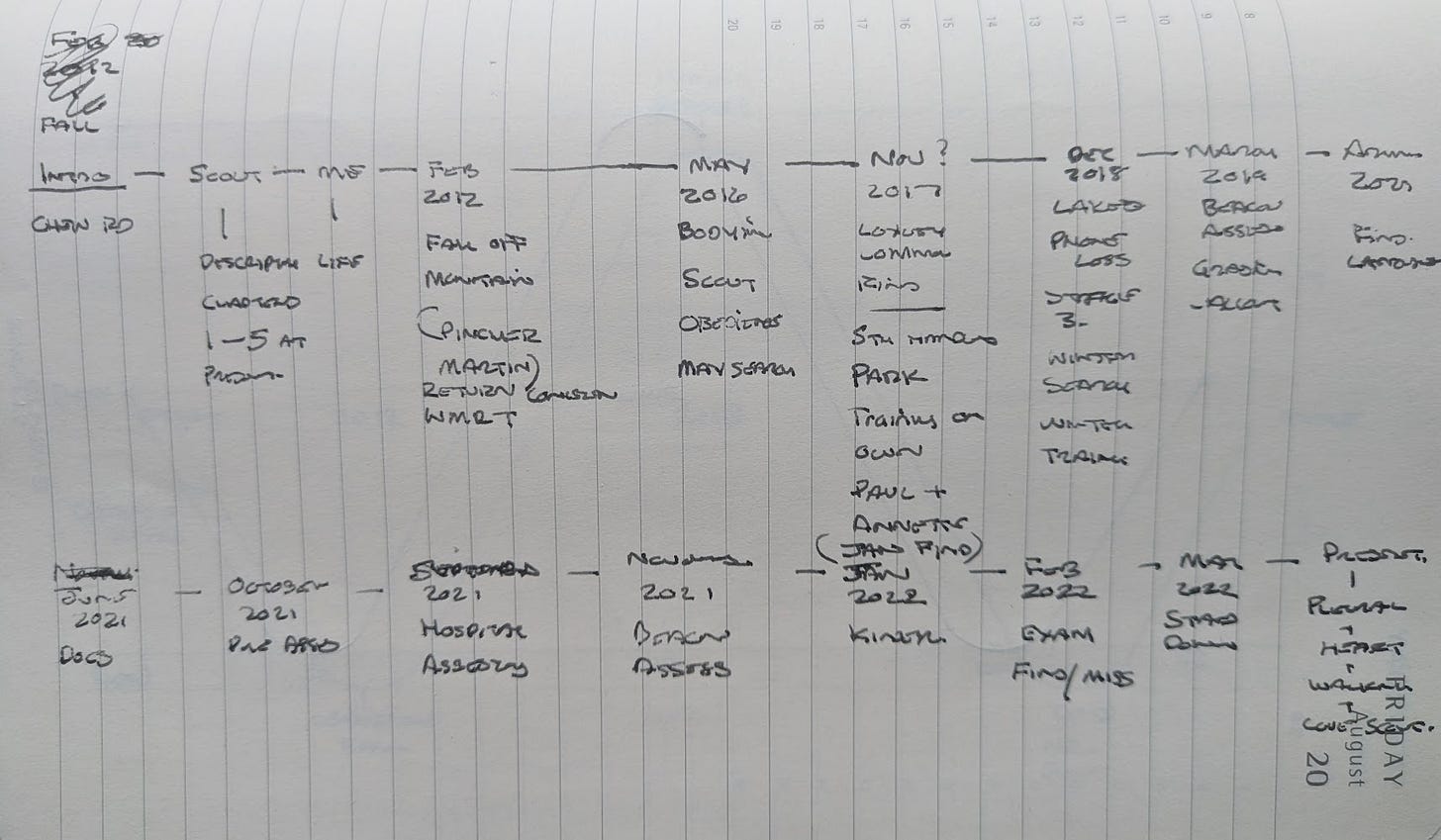Last post I talked about the ethical and stylistic decisions I made in writing The Search. Now I want to talk about the decisions I made about how to write the memoir, plot, structure and narrative. And how I came to make those decisions by mapping out the book.
At the bottom of this post you can read a segment form the book.
The critical thing was a lack of a plan, and I couldn’t get that until I knew what the book was about, it wasn’t even a memoir then, it was a page and a half of mountain literature. I spent many days wandering moors and mountains trying different scenarios, seeing what fitted and what felt good. I knew it had to hold the reader, and that was all I had.
I would sit and write out fragments trying different points of view; what if the landscape spoke, how would I put that into words? The thoughts and jottings coalesced over half a year into a book about training Scout to be a mountain rescue search dog.
I had to avoid a bland text; I did this, then that happened, so I did that, then this happened and so on. It wouldn’t be exciting or interesting. My first stab at structure was a mind map.
The book was called Chew Road back then. I had an almost empty journal from the twenty-ten’s that I used to write down anything that came to mind, purposefully staying away from structure, but drawing lines of connection between topics I thought might be of interest. It isn’t elegant, spellings are off, not everything is in the correct place. It was a very useful exercise, everything on that initial mapping would appear in the book.
Now I had a few ideas and some very tenuous connections I could begin to think about structure.
Working from left to right I worked out in a very rough fashion, events, how they connected, what sequence they fell in and whether I had at that stage any holes in what I had begun to call “the narrative”. Sometimes the progression is horizontal, sometimes vertical. At the bottom I laid out a timeline, very basic, but with the crucial points I wanted to hit from the beginning to the end.
Now I was beginning to see more space appearing between the trees, whereas before, all I could view was a dense amount of lumber in almost pitch darkness. The simple timeline could now begin to be populated with events and a narrative begin to take shape. One of the early events was Scout’s find on Loxley Common in the depths of winter. This could form a standalone story. It has everything: a trainee dog, people lost, winter snowscape, lovers, humour, anarchy, social media, national press and television, and an unexpected gift for the reader.
The story of the find comes after the dramatic opening of the book. A prologue about the landscape of the Chew Valley that set the scene, this was not going to be a how to train a dog book, and at times it was going to be a grim painful narrative. But have faith
The next iteration puts more flesh onto each timeline event. Before 2017 chapters about life, showing Scout off to the reader. Then a dramatic mountain rescue and a chapter that moves into an omniscient narrator, because in real life I had no idea what had happened to me. Robert Macfarlane suggested I read Pincher Martin by William Golding to give me a way into that part of what I was now calling a memoir.
That section worked in several ways. It gave a dramatic account of an incident in remote mountains in very poor weather. Again at night in the snow. It gave me the opportunity to describe how a mountain rescue callout develops, what happens, who are the people involved. And what role a mountain rescue search dog plays.
The notes mean little as they stand to an outsider, but were sufficient for me to begin fleshing the fragments out and seeing how they could link together to make a whole.
It also connected to other parts of the narrative, initially drawing a thread from winter 2012 to Scout’s first find in winter. Now threads were beginning to appear though at first I did not see them. If you look at that year in the image above, there are other events happening. This is building the layering that I found to be so important. The layering prevented the flat footed dedum-dedum-dedum of a boring training manual. Now the book was gaining colour, texture and depth. It was here the decision was made to weave my life events backwards and forwards within the story of Scout. And that led to dropping, what I came to call nodes, small inconsequential sentences or even a word, that would gain greater significance later on in the text. I wanted the reader to have ha-ha moments, to flick back through the pages to find where they had first read about the event. And how could they have missed it?
Now I could look at the shape of the narrative. For that I thank John McPhee.
McPhee was a man who wrote a whole book about oranges because he noticed the orange he drank at grand central never changed colour. How could that be, he thought? Or maybe it was because it never was the same colour. I forget.
Regardless, McPhee’s book Draft No 4 details his process for writing the superb and many articles he produced for the New Yorker. A Pulitzer prize winner and acknowledged pioneer of the genre, creative nonfiction.
I adapted McPhee’s work covering the arc of a story. By this time, having read In Cold Blood by Truman Capote and Touching the Void by Joe Simpson, I had understood that The Search could not be a collection of memories. It had to be a story, based on real life, but there had to be narrative arcs, there had to be success, near failure, pain and happiness. In short I wanted the reader to laugh with tears in their eyes and cry with pain so they could no longer go on reading. If I achieved that the book would be a success.
The whole book had a story arc, events plotted out to give a sequential whole set against time. Within each arc, the highs being success, the lows being failure, were other narrative arcs, so that the book became a collection of interlocking stories that wound around each other and at the end, all threads drawing together for the big finale denouement.
Above is the first section of the book, before Scout comes on the scene. It is like the plot of a film because that’s how I write, I see the story first, hear the characters build the worlds and then put it down onto paper. ABC are the turning points, moments of maximum compression or expansion: something happens so that as a consequence something else has to happen and because of that there had to be this. Having got this framework I could put flesh on each event. Not all events would make it into the final manuscript, but at this stage that is not a concern.
Along with this page come my thoughts and ideas written below.
This section details what each piece of writing must do and importantly how I am going to achieve that. What I need to research, what to include and not. Any ethical questions I need to address. If it is in red then it is a priority. This also begins to put the threads into the layering, personal events, mountain rescue team events, humour (being super stoically brave and magnanimous in hospital after my fall and telling Alison she didn’t need to travel from Sheffield to Carlisle. So she didn’t!!!).
All this made a story after five years of writing.
Below is a section from The Search where Scout finds the lovers lost in the woods.
Take care and good luck.
Paul
Working my way towards the wall that separates the common from the woodland, I hear Scout’s bark split the night. He cannot possibly have had time to find Paul. I haven’t had a ‘dog in’ either. Scout thunders through the opening straight to me, everything about him shouts ‘find’. I can see the excitement in his eyes piercing through the darkness, see it rippling along his body. As he breaks the snow in front of me his head lifts and a mighty bark rattles trees, he spins, retraces his steps without once looking behind, and merges once more into the trees. He must have found Paul.
Another bark, another burst out of the trees. He’s so consumed by his ‘find’ he slides into my feet, snow ploughing ahead of him. He indicates, shoots me a frustrating look and is gone. He really has found Paul. I pick up the pace, noting the look he gave – me letting the team down – and slip through the wall into the heavy silence of the woodland. I stand and listen, allowing senses to adjust in the monochrome landscape, sweeping my eyes through the trees, scanning nature’s barcode, my head torch strobing against trunk and snow. I can see a light, Scout’s I assume, for who else would be here, only mad men and English dogs.
The light moves through the trees blinking on and off, there and not there, a binary existence. It’s Scout, heading back to me, intensely angry, the bark and then away again. I feel slow as he draws me down into the dense nothingness where the trees are thickest, and the boulders huddle in crowds. I scramble across rocks, testing snow-covered gaps for leg breakers, my hands freezing. The light ahead of me has ceased its movement. My directions to Paul must have been poor, this is a long way from the trig pillar.
I’m close enough to see Scout watching me, see his displeasure, tapping his back paw and glancing at a watch. I apologise, saying I’m trying to be careful. He disappears behind a large holly tree. Finally, I reach the track he was impatiently waiting on. Scout sits in the centre of the broad white strip, his tail scouring scallop shells in the snow, his head to one side, eyes searching for his toy. There’s just me and Scout and falling snow. I ask him to show me, his head turns left. I move a step closer. He looks back at me then to the left again. Two more steps and I’m beside him. He looks at me then side glances left, the whites filling the space. Almost blending with the snow-covered holly are two people clinging to each other, their eyes darting between me and Scout, their faces full of fear.
‘Good boy.’
Scout springs into the air as I launch his toy, I grab the rope and he pulls me to the ground where I flail around issuing lots of ‘Grrrr.’ In my periphery, I see the two people, male and female, arms around each other trying to step further back, the holly making them jump as it pricks through their clothing, showers of snow dumping on to their heads. I notice they don’t have many clothes on – no coat, no winter layers, no hat or gloves – more suited for a night on the dance floor, the thin white tops glowing blue from my headlamp. It’s odd, this time of year, at night when it’s snowing.
‘Are you ok?’
‘We’re lost. We’re trying to get out of the woods. That dog kept coming up to us and barking and running away.’
‘This is Scout. He’s training to be a search dog and you two are his first real find. Where are your coats?’
‘We got lost. We can’t find our way out, we’re very cold. Can you help us?’
I’m on a massive high and almost forget the hero of the moment who is nodding at his ball for more play. I am so proud of him, finding someone in distress, doing his job. On the way off the common I ask if I can take a photo, excited words tumbling from my mouth, the air condensing around our heads in a cloud. I’ll put it on social media, it’s such a big thing for Scout. No, they say, no to names, no to address, no to phone number, they just want to get home. We guide them to the lights of civilisation, their heads together exchanging whispers. I watch, the strangeness coalescing around my mind. Why would anyone come out on a night like this wearing so little?
We stand side by side watching the two become dots in the cityscape. I wonder if Scout knows
what he’s done. I tell him he did good and give him a treat. There is a possibility the speed limit may not have been adhered to on the short drive home. Alison tucks Scout into bed covering him in more kisses. A shower eases the electricity running through my body while my mind reruns the exercise, playing over the odd response of the couple. The penny drops.
Scout’s find is splashed across social media, picked up by the papers, making the front page of the Daily Telegraph, Scout’s beautiful face beaming out from several columns. The BBC phone, wanting Scout on The One Show that evening, along with the two people rescued. I say I don’t think that will be possible.
‘Why? It’s a great story, and Scout is so beautiful.’
‘It is, he is. But they didn’t want any publicity.’
‘Why? They must have been so relieved and happy Scout saved them.’
‘Probably. But I don’t think they would want it known.’
‘We’d be very gentle.’
‘I’m not explaining myself very well. I don’t think they should have been there, at night, not wearing many clothes, with each other.’
‘Really. Oh. Ooooh, I see what you mean. Does that happen a lot?’
‘It’s Scout’s first time, but I’m told it’s not unusual.’
‘Fantastic. What a shame. It would have been great to have such a handsome dog on the show.’
Our fifteen minutes of fame slips by. I’m glad. It would have brought too much attention. Aside from the comedy of it all, Scout did his job well, and I trusted his judgement. In the following days I bask in the moment and Scout absorbs the praise heaped on him from the community on the common. We never see or hear from the couple again.












Hi Paul - I have literally JUST, this very minute, finished the Search and came onto Substack to see if you did happen to write on here. What a wonderful surprise to come across not only your whole Substack, but this pieces. I’m fascinated by the process of writing, so thank you for sharing all of these bits with us! It’s an incredible book, and I do truly feel honoured to have spent the past few weeks with you and Scout as I read through your journey.
That the words flow so apparently easily on the printed page – better than most books I have read… – demonstrates (to me, at least) what a great writer you are. None of the swan’s paddling and splashing is at all evident; and yet I know just how necessary all that hard grift was… – which is another piece of evidence for your greatness: your inability to shirk, to ignore the tough stuff, the research, the structuring, the deletion of pages that don’t move the story on in the necessary way. And all this after (and still) living through the tough physical stuff.
I am in awe of anyone who writes a book. Those few who pen books this magnificently great (let’s say you and Herman Melville) – well, ironically, I have no words. Thank you, Paul.